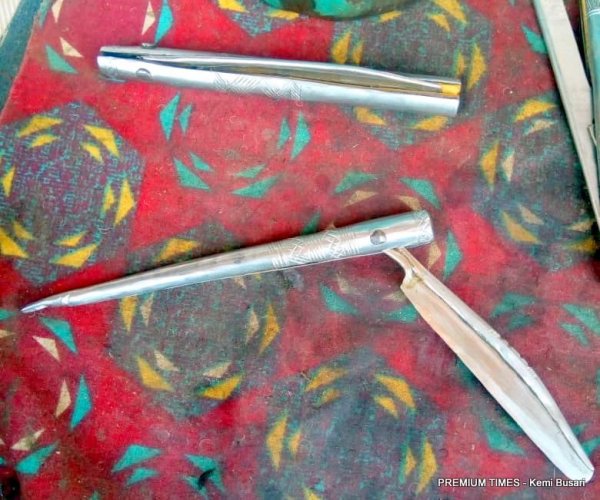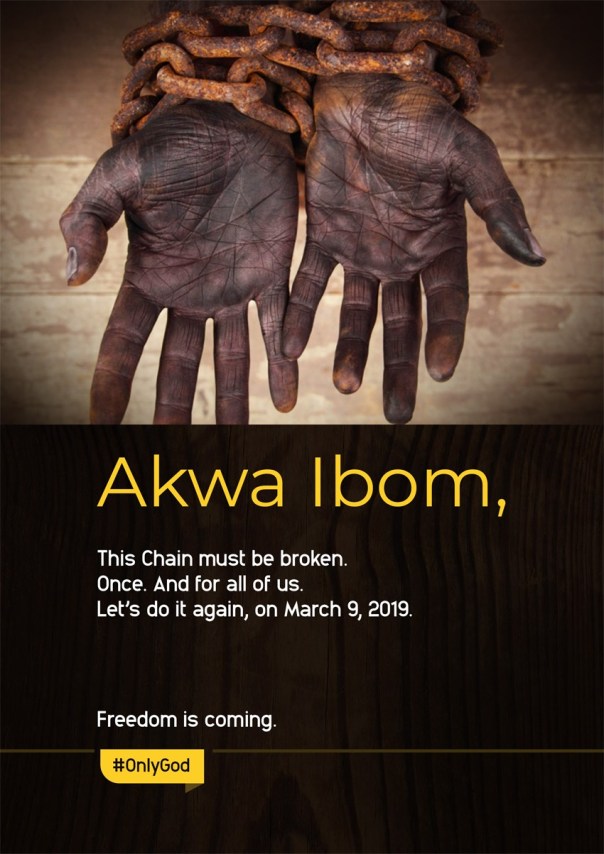In this second part on the old hair cutting methods still in use in major Nigerian cities, Kemi Busari highlights the risk in sharing blades and other unsterilized shaving tools. Read the first part here.
Located opposite the popular Y-junction at Oremeji in Ibadan, the Oyo State capital, Rabiu Fagunwa’s wooden shop might have accommodated more customers in its 55 years of existence than a football stadium in one game.
Many customers that have climbed the 11-step staircase of the barber shop, in that time, might have done so because Mr Fagunwa, a septuagenarian, offered them a cheaper haircut.
On this day, the veteran was shaving with a manual clipper dotted in brown, save the blade area which sheen was preserved due to friction with the numerous heads it has encountered. The outdated tool grumbled as Mr Fagunwa scrapes off the last strand of hair on his customer, an equally aged man.
Mr Fagunwa soon dropped the clipper and picked up a scissors – the second most important tool in his wooden shop, which he uses to trim the edges of his customer’s hair.
“I have the electronic clipper at home but how will I use it? Do you see power supply? Whether there is supply or not, I work,” he says, justifying his bias for the manual clipper.
Pa Fagunwa is perhaps the oldest barber in Ibadan having started since the 60s.
“I started when shaving was 2 kobo per head for children and 3 kobo for adults. Later it became four kobo and now one head goes for at least 100.”
In Ibadan, one of Nigeria’s largest cities, a regular cut with an electronic clipper goes for as low as N200 and could be up to N1,000 depending on the area. However, local barbers as Mr Fagunwa provide cuts for as low as N100 with a rusty clipper.
But Akano Olawale, a civil servant, who has been shaving with razor for over ten years wants something ‘cheaper’ and ‘safer.’
“One of the reasons (I shave with razor) is the cost and the second one is that I try to avoid diseases that may be transmitted through clipper. Some people have bumps and once you share clipper with them, you’ll get it.”
Aside the possibility of contracting diseases, the father of three cuts cost by shaving himself and children with blades. He gave a mathematical explanation.
“If you go to barber’s shop now, you can shave for as much as N500 but if I go to market, a pack of blade is not up to N100, with five inside, I can use it for like 10 times. I use one twice, each side at different times. So, I don’t spend up to N10 for my cuts. Let’s assume shaving in barber’s shop is N300, that multiplied by 10 is 3, 000 and N70 blade will serve the purpose,” he explains.
For the same reason, Abass Abdulazeez, a University of Ibadan graduate shaves himself and his children with blades.
“It is economical as blade is just N20, and with a blade of N20, I could do many things: I would cut my hair, cut my nails,” he says.
Though he watched his father use razor while growing up, Mr Abdulazeez was never interested until an incident in 2001.
“I began using blade (razor) as far back as 2002. What caused this is because there was a day I was at the barber’s shop when the light went off and generator wasn’t commonplace like now. He eventually used razor blade to complete the haircut. I was angry because I paid for clipper.
“Since then I became discouraged; if I’m to go there some other day what’s the guarantee light (power) won’t go off again? And what’s the essence of the money I might have paid?”
Mr Abdulazeez does not allow his two sons visit barbers’ shops – they have never – as he prefers to shave them himself. To cut the cost of shaving, he re-uses the same blade he uses in shaving himself for the children.
“Even when I buy a blade of N20, after I use it to cut my hair and nails, I use it on my two sons to cut their hair.
“I’ve never used blade to inflict a cut on my sons before. The thing is that, apart from me, I don’t allow anyone else to cut their hair and they don’t share blade with outsiders.
“When HIV/AIDS became a rampant disease, I also thought that which is safer? Blade or clipper? Though they say they sterilize these clippers after use, but I don’t trust the process.
“Also, clipper vibrates, and I feel it could cause medical damage to the brain of little kids. Razor if carefully used and used professionally cannot have side effects.”
Expert Analysis of Claims
The duo are very concerned with cutting the cost of haircut but this may come at a great health risk if either of the fathers or one of the children is infected with a transmissible disease.
Bacteria, fungal and viral diseases can be transmitted through such practice, says Shakirat Gold-Olufadi, the Senior Registrar, Dermatology, Rheumatology and Genitourinary Medicine, Lagos State University Teaching Hospital (LUTH)
“Hepatitis B, C and HIV are some of the diseases that can be transmitted via unsafe shaving methods. This occurs when secretions like blood or body fluids from an infected person with these viruses come in contact with an uninfected person through a cut on his scalp during shaving. Bacterial and fungal infections are also transmissible through unsavoury shaving methods” she says.
On clipper vibration, Nyomudim Essen, a dermatologist and Medical Director, Garki Hospital, Abuja, said Mr Abdulazeez’ claim cannot be substantiated.
He noted that the use of clipper poses same risks as blade and knife in disease transmission.
“This is unsubstantiated,” he said. “It is not known that the vibration from the clipper does any damage; it is therefore regarded as safe. Note that it has recently been confirmed by studies done in South Africa that sharing a clipper has the same hazard of transmitting hepatitis B and C as well as HIV.”
Dwight Kurk, a University of Vermont neuroscientist, agrees with Mr Essen. Responding to a similar question on Quora.com, a knowledge sharing platform, Mr Kurt said clipper vibration is harmless.
“The brain is fully capable of withstanding those (clipper) vibrations, and much more that you likely withstand on a daily basis. Turning your head quickly, for example, causes rapid pressure changes within the skull. But the brain isn’t so sensitive.
“It’s encased in the skull, three layers of meninges and bathing in cerebrospinal fluid, all of which combine to be excellent buffers between the brain and the outside world.
“Unless you bang your head badly enough to get a concussion, there’s nothing to worry about here,” he said.
Knife still used in Kaduna
Back in the days when barbering business was more exclusive, Inuwa Mohammed cut hair with only a local shaving knife. But all these changed in the 90s when he had to introduce razor to his customers although he never did away with the blade.
Today, he uses razor and local shaving knife for his customers. He spoke to PREMIUM TIMES at his Lagos Road stand, a spot he claims to be the first barber to occupy about 22 years ago.
“We don’t use razor before. It is this knife we use back then. But I had to change to razor when it came.
“I use it only when the customer ask me to use it to shave him. If you say you don’t want me to use the tool with razor, that’s when I use the other tool. There are customers who preferred me to use this tool while majority preferred the one with razor.”
The knife comes handy, with a clamp that holds its cutting edge secured while not in use. It can be sharpened with rocks or stones when it goes blunt.
Some customers request extra sterilisation before using Mr Mohammed’s knife.
“Before I use the tool to shave, I first of all wash it with spirit…but some customers will request that I boil it. I will do that before using it to shave them,” he said.
Boiling however ‘will not help to kill all the bacteria’ that the tool may have harboured says Ayomide Aranmolate, a dermatologist.
For using a knife without proper sterilisation, the expert says Mr Mohammed’s shop should be closed down by authorities.
“That one is a danger,” he says of Mr Mohammed’s knife “The shop should be closed down. They need to be more educated about it. If you will use such object, you will need a sterilant. The normal process is to dip it for some minutes.”
The Risks
Shaving with razor is not harmful in itself, but the process and practise by majority of barbers in Nigeria has made it more harmful, raising the fear of disease contamination such as Hepatitis A,B, C, folliculitis, tinea capitis and the most-dreaded HIV/AIDS.
Even though there is no known data on HIV/AIDS transmission through shaving, statistics from four cities – Lagos, Abuja, Ibadan and Kaduna – captured in this report point to the risk of contracting the virus. The four states rank high in the prevalence rate, according to the National Agency for the Control of AIDS.
You may be interested

Arsenal Equal Chelsea’s London Derby Feat After 5-1 Win Vs Palace
Webby - December 21, 2024Arsenal equaled Chelsea’s London derby achievement following their 5-1 win against Crystal Palace in Saturday’s Premier League game at Selhurst…

Haaland Backs Guardiola To Turn Man City’s Poor Form Around
Webby - December 21, 2024Erling Haaland had said he and his Manchester City teammates are still backing manager Pep Guardiola to turn the team’s…

PSG To Reignite Interest In Osimhen
Webby - December 21, 2024Paris Saint-Germain have contacted Napoli to discuss signing Victor Osimhen in January, according to reports in France.It is reported that…



























![American Pastor, David Wilson Seen Eating The Box Of Woman Who Isn’t His Wife [Video]](https://onlinenigeria.com/wp-content/uploads/2019/10/american-pastor-david-wilson-seen-eating-the-box-of-woman-who-isnt-his-wife-video-150x150.jpg)










Leave a Comment